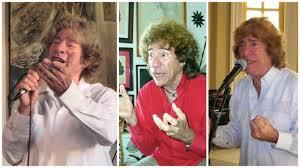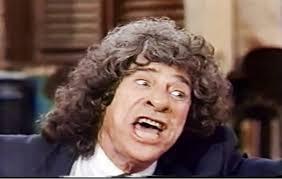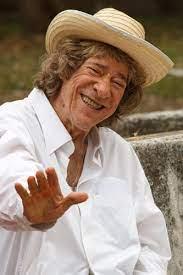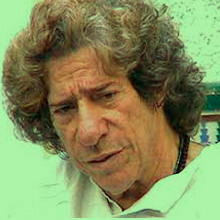Soy amigo de un grande del humor cubano de todos los tiempos. Un matanceros como yo. Tengo el honor y el placer de conversar hoy con el Maestro Carlos Ruiz de la Tejera.
¡Qué podría decir de él para que los lectores de Humor Sapiens que no lo conozcan?
Bueno, pues, el Maestro es actor de teatro, cine, radio y televisión. Actor tanto dramático como cómico. Creador de un estilo que lo hizo único. Se ha presentado en escenarios de toda Cuba y muchos en el extranjero. Desde 1992 celebra mensualmente la Peña de Carlos Ruiz de la Tejera en el Museo Napoleónico de La Habana.
Ha actuado en 6 películas, entre ella tres grandes comedias del director Tomás Gutiérrez Alea. Y ha obtenido El Sello de la ciudad de Barquisimeto, Placa de Reconocimiento de Fundacultura y la Gobernación del Estado Lara, Venezuela; La Giraldilla de La Habana, entregada por el Gobierno de la Ciudad; Distinción Majadahonda, por el aporte a la causa internacionalista, otorgado por la Unión Nacional de Escritores y Artistas de Cuba (UNEAC) y Distinción de Interés Cultural por el trabajo artístico, entregado por el honorable consejo municipal de la Ciudad del Rosario, Argentina, entre otroe premios y distinciones.
Un día viendo un programa estelar de la televisión cubana, veo a un actor cómico haciendo un personaje distinto; con leonina melena, boca enorme, con muchos gestos, sobreactuando, vestido de negro y con capa. Hacía un monólogo de Héctor Zumbado (1932-2016), el gran humorista literario cubano. Era una novedad ese personaje. Profesor Tarado Tallarines, creo que se llamaba. Otro tipo de humor rompiendo esquemas en Cuba. Mirando ese día la televisión me contaminé. Entró en mí las ganas de hacer humor algún día.
Tuve el privilegio pocos años después de compartir con él escenarios cuando se presentaba con el Conjunto Nacional de Espectáculos y de que actuara él nuestros guiones.
Después, estando yo residiendo en Chile, visitó este país y pude compartir con él al final de su actuación.
Ahora tengo la suerte de tener este vis a vis con el Maestro Carlos Ruiz a través del correo electrónico…
PP: Maestro, ¿te gusta que te hagan entrevistas?
CARLOS RUIZ: Me encanta que me entrevisten, sobre todo si el entrevistador tiene algo inteligente que preguntar.
PP: Cruzo los dedos entonces para que se le ocurran preguntas que consideres interesantes. Comienzo. ¿Cómo ves el estado del humor en Cuba, en televisión, radio, teatro, literatura y gráfica?
CARLOS RUIZ: En este año, como todos los años, incluyendo en el cual tú surgiste, el humor está muy saludable, pero tú mezclas los medios con el estado del humor y como bien sabes, los medios ahogan a los mejores talentos. No por gusto Les Luthiers, Enrique Pinti, etc. se niegan a trabajar directamente en la televisión, cosa que sin dudas debes saber.
PP: Claro que lo sé. Es por el mismo motivo que mi grupo La Seña del humor, hizo poca televisón. La intención de mi pregunta era saber cómo estaba en todos los medios, incluyendo el teatro, la literatura, la gráfica, etc. Pero sigamos. Tú que has viajado tanto sabes que en varios países de América Latina se dice: "Mi país es un pueblo de humoristas", "en mi país, tú mueves una piedra y sale un humorista", etc. ¿En Cuba se dice lo mismo?
CARLOS RUIZ: Exactamente, todos venimos de la Madre Patria y tenemos las mismas raíces. No por gusto existió Quevedo, Lope de Vega, Garcilaso, etc.
PP: ¿Así que piensas que el pensar que nos creemos tan humoristas todos, se debe a que tenemos sangre y cultura española? No lo había pensado así. Pero somos. Buenos también para la tragedia y la histeria, ¿no es cierto? A ver, Maestro, según su opinión, ¿es verdad la acuñada frase: "Es más fácil hacer llorar que hacer reír?
CARLOS RUIZ: Las dos cosas son difíciles. Hacer llorar es llegar a lo más sensible del alma humana, enfrentándola a las verdades que cotidianamente las mentiras tapan y hacer reír, pero que la gente ría y piensen también es difícil y tú lo sabes.
PP: Sí, supongo que lo sé. Por eso coincidimos, pero lo debo preguntar todo en aras de lo mejor para nuestros lectores interesados en el humor. Pero vamos a cosas más personales. Por ejemplo, ¿cuándo decidiste hacerte humorista?
CARLOS RUIZ: Después de hacer muchas comedias, dramas y tragedias en el teatro, me di cuenta que si dedicaba todo lo aprendido a la realización de monólogos y canciones satíricas, podía buscar la manera más fácil de comunicarme con el público, cosa que sucedió y así me lo comunicó nuestro gran Nicolás Guillén, quien me hizo ver que en mi contexto había creado un estilo nuevo. Mis primeros discos fueron presentados por él, a petición suya. Eso comenzó a suceder en el año 1976, hasta ese momento yo solo hacía teatro y recitales musicalizados con jóvenes trovadores.
PP: ¡Gracias a dios!, como diría mi madre, se te ocurrió hacerc eso. Y mirado desde el tiempo, teorizando un poco, ¿el humorista nace o se hace?
CARLOS RUIZ: Bueno, para mí, se nace humorista. La cultura, las técnicas teatrales, el rigor, la disciplina del artista hace que pueda elaborar como un escultor el tipo de humor que pretenda hacer, que por supuesto lleva implícito la comunicación.
PP: Es cierto, Maestro, pero estoy pensando que quizás alguien que no tenga el don, la gracia, la vis cómica de nacimiento, pero se empeña en aprender el lenguaje del humor y del arte en que lo canalizará, y se esfuerza, gana cultura, se desarrolla en todo sentido, con esa disp¿ciplina que mencionas y un enorme interés, puede llegar a ser un profesional. No sé si alguien “genial”, pero quizás mejor incluso que alguien que nazca con la viscómica y no se desarrolla tanto, ¿no es cierto? Bueno, de tarea para pensarlo más. Y sigamos contigo, ¿cuál ha sido el mejor y el peor momento de su carrera hasta el día de hoy?
CARLOS RUIZ: Aparte del gran amor que el pueblo de Cuba me demuestra tanto aquí como en el extranjero, creo que artísticamente lograr hacer un Moliere en París con el éxito artístico y económico que tuvo fue un triunfo no solo para mí, sino para el humor cubano. El peor momento fue cuando estuve paralizado dos meses en el Hospital Ortopédico por un problema en la columna vertebral que gracias al desarrollo ortopédico del país, al amor de mis amigos y la presión del pueblo, vencí. Pero tuve que aprender a volver a caminar, a correr y a brincar, cosa que sigo haciendo en la calle y en el escenario.
PP: Maestro, como profesional del humor, ¿se ríe fácil? ¿Con qué tipo de chistes?
CARLOS RUIZ: No, no me río fácil. Tengo una tendencia al surrealismo. No sé si te acuerdas de Jacques Tati en las Vacaciones de Mesié Hulot, así mismo a Pierre Etaix, a quien tuve la suerte de presentar en Cuba a sus 84 años en el Festival de Cine Francés de 2013. Asimismo me gusta el humor de Les Luthiers, el de Enrique Pinti, las caracterizaciones femeninas de Antonio Gasalla y las presentaciones que hicieron en Cuba para orgullo de Matanzas aquel grupo que hizo historia, tu grupo, La Seña del Humor.
PP: Bueno, ante de seguir, lo primero es agradecerle su generosidad de mencionar a mi grupo entre todos los grandes que señaló. Un honor vinviendo de usted, Maestro. Y ahora, ¿alguna anécdota relacionada con nuestra profesión?
CARLOS RUIZ: Esta te la debo, pues tengo que pensarla, ya que son muchas.
PP: Bueno, yo puedo desclasificar una, si me permite. En el año 1984, fundamos el grupo la Seña del Humor de Matanzas. Desde el inicio, Virulo, el derector del Conjunto Nacional de Espectáculos (CNE) y sus miembros, entre los que se encontrabas tú, Tatica, Ana Lidia Méndez, Zulema Cruz, el chileno Jorge Guerra, Eduardo Rómulo y Carmita Ruiz, más los bailarines, enseguida nos apoyaron, nos asesoraron. Y comienza a pasar el tiempo y en el año 1988 aparece un comentario crítico en una publicación nacional donde una periodista afirma que la Seña ha superado a sus maestros del CNE. Eso provocó un malestar entre la gente del CNE y se dijeron cosas que se dicen solo cuando uno se deja llevar por las emociones. Entonces nosotros nos molestamos como reacción y pasamos unos días incómodos, algo que nunca había sucedido antes. Pero el único que no dijo nada, al contrario, se acercó a nosotros con buen ánimo, fue usted Maestro. Al poco tiempo Virulo, Jorge Guerra y Zulema se disculparon y volvió la buena onda entre ambos grupos. Es primera vez que cuento esa anécdota. Y hablando de ese ambiente, ¿con cuáles colegas cubanos se identifica, Maestro?
CARLOS RUIZ: Me identifico en este momento con Osvaldo Doimeadios, con Rigoberto Ferrera, con Octavio Rodríguez (Churrisco), con Luis Silva, con Alejandro García y con Pepe Pelayo.
PP: De nuevo mil gracias por su deferencia. De verdad, un honor. Pero, ¿qué me aconsejaría a mí como humorista?
CARLOS RUIZ: Partir siempre de la verdad, ya que como se dicen tantas mentiras, decir la verdad provoca risa. La forma de hacerlo depende del creador. Darío Fo, Premio Nobel de Literatura en su Misterio Bufo desenmascaró a la alta jerarquía eclesiástica católica. Tuvimos la suerte de verlo en Cuba con su esposa.
PP: Seguiré siempre su consejo, Maestro. Por lo menos en el humor, siempre trataré de estar con la verdad.
Le doy miles de millones de gracias por su tiempo, su atención y su cariño. Le deseo lo mejor del mundo y que siga infinitamente con sus éxitos.



Interview with Carlos Ruiz de la Tejera
By Pepe Pelayo
I have a tendency towards surrealism
I am a friend of a great Cuban humorist of all time. A man from Matanzas like me. I have the honor and pleasure of speaking today with Maestro Carlos Ruiz de la Tejera.
What could I say about him so that Humor Sapiens readers who don't know him?
Well, the Maestro is a theater, film, radio and television actor. Both dramatic and comic actor. Creator of a style that made him unique. He has performed on stages throughout Cuba and many abroad. Since 1992, the Peña de Carlos Ruiz de la Tejera has been celebrated monthly at the Napoleonic Museum in Havana.
He has acted in 6 films, including three great comedies by director Tomás Gutiérrez Alea. And it has obtained the Seal of the city of Barquisimeto, a Plaque of Recognition from Fundacultura and the Government of the State of Lara, Venezuela; The Giraldilla of Havana, delivered by the City Government; Majadahonda Distinction, for the contribution to the internationalist cause, awarded by the National Union of Writers and Artists of Cuba (UNEAC) and Distinction of Cultural Interest for artistic work, awarded by the honorable municipal council of the City of Rosario, Argentina, among other awards and distinctions.
One day watching a stellar program on Cuban television, I see a comic actor playing a different character; with leonine mane, huge mouth, with many gestures, overacting, dressed in black and with a cape. He was doing a monologue by Héctor Zumbado (1932-2016), the great Cuban literary humorist. That character was new. Professor Tardo Noodles, I think his name was. Another type of humor breaking schemes in Cuba. Watching television that day I became contaminated. I had the desire to do humor one day.
I had the privilege a few years later of sharing stages with him when he performed with the National Entertainment Ensemble and having him act out our scripts.
Later, while I was residing in Chile, he visited this country and I was able to share with him at the end of his performance.
Now I am lucky enough to “dialocate” with Maestro Carlos Ruiz through email…
PP: Teacher, do you like being interviewed?
CARLOS RUIZ: I love being interviewed, especially if the interviewer has something intelligent to ask.
PP: I'm crossing my fingers then that you come up with questions that you find interesting. Beginning. How do you see the state of humor in Cuba, on television, radio, theater, literature and graphics?
CARLOS RUIZ: In this year, like every year, including the one in which you emerged, humor is very healthy, but you mix the media with the state of humor and as you well know, the media suffocates the best talents. Not for nothing Les Luthiers, Enrique Pinti, etc. They refuse to work directly on television, which you should definitely know.
PP: Of course I know. It is for the same reason that my group La Seña del humor did little television. The intention of my question was to know how it was in all media, including theater, literature, graphics, etc. But let's continue. You who have traveled so much know that in several Latin American countries it is said: "My country is a town of comedians", "in my country, you move a stone and a comedian comes out", etc. Is the same thing said in Cuba?
CARLOS RUIZ: Exactly, we all come from the Motherland and have the same roots. It was not by chance that Quevedo, Lope de Vega, Garcilaso, etc. existed.
PP: So you think that thinking that we all think we are such comedians is because we have Spanish blood and culture? I did not think about it like that. But we are. Good for tragedy and hysteria too, right? Let's see, Master, in your opinion, is the coined phrase true: "It is easier to make people cry than to make them laugh?"
CARLOS RUIZ: Both things are difficult. Making people cry is reaching the most sensitive part of the human soul, confronting it with the truths that lies cover up on a daily basis and making people laugh, but making people laugh and think is also difficult and you know it.
PP: Yeah, I guess I know. That's why we agree, but I have to ask everything for the best for our readers interested in humor. But let's get to more personal things. For example, when did you decide to become a comedian?
CARLOS RUIZ: After doing many comedies, dramas and tragedies in the theater, I realized that if I dedicated everything I had learned to creating monologues and satirical songs, I could find the easiest way to communicate with the audience, which happened and This is what our great Nicolás Guillén told me, who made me see that in my context he had created a new style. My first albums were presented by him, at his request. That began to happen in 1976, until then I only did theater and musical recitals with young troubadours.
PP: Thank God! As my mother would say, you thought of doing that. And looked at over time, theorizing a little, is the comedian born or made?
CARLOS RUIZ: Well, for me, you are born a comedian. The culture, the theatrical techniques, the rigor, the discipline of the artist means that he can create, like a sculptor, the type of humor he intends to create, which of course involves communication.
PP: It is true, Master, but I am thinking that perhaps someone who does not have the gift, the grace, the comic vision from birth, but insists on learning the language of humor and the art in which he will channel it, and makes the effort, wins. culture, it develops in every sense, with that discipline that you mention and an enormous interest, it can become a professional. I don't know if someone is "great", but maybe even better than someone who is born with viscomics and doesn't develop as much, right? Well, homework to think about it more. And let's continue with you, what has been the best and worst moment of your career to date?
CARLOS RUIZ: Apart from the great love that the people of Cuba show me both here and abroad, I think that artistically managing to make a Moliere in Paris with the artistic and economic success it had was a triumph not only for me, but for humor. Cuban. The worst moment was when I was paralyzed for two months in the Orthopedic Hospital due to a spinal problem that, thanks to the country's orthopedic development, the love of my friends and the pressure of the people, I overcame. But I had to learn to walk, run and jump again, which I still do on the street and on stage.
PP: Master, as a humor professional, do you laugh easily? With what kind of jokes?
CARLOS RUIZ: No, I don't laugh easily. I have a tendency towards surrealism. I don't know if you remember Jacques Tati in Mesié Hulot's Vacation, as well as Pierre Etaix, whom I was lucky enough to present in Cuba at the age of 84 at the 2013 French Film Festival. I also like the humor of Les Luthiers, that of Enrique Pinti, the female characterizations of Antonio Gasalla and the presentations that the group that made history, your group, La Seña del Humor, made in Cuba for the pride of Matanzas.
PP: Well, before continuing, the first thing is to thank you for your generosity in mentioning my group among all the great ones you mentioned. An honor coming from you, Master. And now, any anecdotes related to our profession?
CARLOS RUIZ: I owe you this one, because I have to think about it, since there are many.
PP: Well, I can declassify one, if you allow me. In 1984, we founded the group La Seña del Humor de Matanzas. From the beginning, Virulo, the director of the National Entertainment Ensemble (CNE) and its members, among whom were you, Tatica, Ana Lidia Méndez, Zulemqa Cruz, the Chilean Jorge Guerra, Eduardo Rómulo and Carmita Ruiz, plus the dancers They immediately supported us, advised us. And time begins to pass and in 1988 a critical comment appears in a national publication where a journalist affirms that the Seña has surpassed its CNE teachers. That caused discomfort among the people of the CNE and things were said that are only said when one lets oneself be carried away by emotions. So we got upset in reaction and spent a few uncomfortable days, something that had never happened before. But the only one who didn't say anything, on the contrary, approached us with good spirits, was you Master. Shortly after, Virulo, Joirge Guerra and Zulema apologized and the good vibes between both groups returned. It's the first time I tell that anecdote. And speaking of that environment, which Cuban colleagues do you identify with, Maestro?
CARLOS RUIZ: I identify at this moment with Osvaldo Doimeadios, with Rigoberto Ferrera, with Octavio Rodríguez (Churrisco), with Luis Silva, with Alejandro García and with Pepe Pelayo.
PP: Thank you again for your courtesy. Truly, an honor. But what would you advise me as a comedian?
CARLOS RUIZ: Always start from the truth, since as so many lies are told, telling the truth provokes laughter. How to do this depends on the creator. Darío Fo, Nobel Prize winner in Literature, in his Bufo Mystery unmasked the high Catholic ecclesiastical hierarchy. We were lucky to see him in Cuba with his wife.
PP: I will always follow your advice, Master. At least in humor, I will always try to be with the truth.
I thank you thousands of millions for your time, your attention and your affection. I wish you the best in the world and may you continue with your successes infinitely.
(This text has been translated into English by Google Translate)

